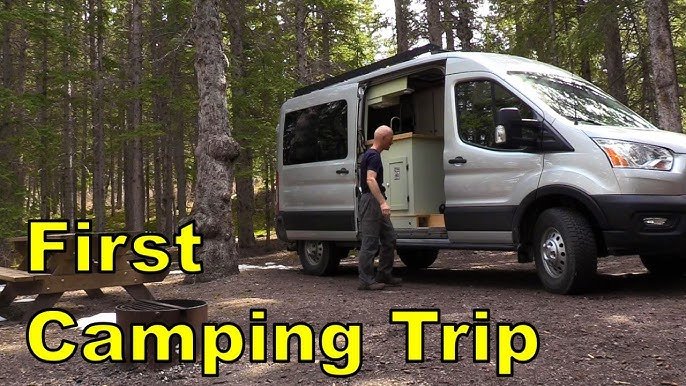Camping on your first overland adventure can be both thrilling and daunting. It’s a new experience filled with excitement and challenges.
Embarking on your first overland adventure means stepping into a world of exploration and discovery. The open road stretches ahead, promising stunning landscapes and unforgettable moments. But with this excitement comes the need for preparation and knowledge. Camping in the wild isn’t just about setting up a tent; it’s about understanding your surroundings, staying safe, and making the most of your journey.
Whether you’re a seasoned traveler or a complete newbie, this guide will help you navigate the basics of camping on an overland trip. From essential gear to practical tips, get ready to embrace the adventure with confidence and ease.

Credit: www.truckcamperadventure.com
Choosing The Right Gear
Choosing the right gear is crucial for your first overland adventure. The right equipment ensures comfort and safety. It also enhances your overall experience. Let’s dive into the essentials for camping gear.
Tents And Sleeping Bags
Your tent is your home away from home. Pick a tent that fits your group size. Make sure it’s easy to set up. Check for weather resistance. A durable tent keeps you dry and warm. Think about the weight too. A lightweight tent is easier to carry.
Sleeping bags are just as important. Choose one that suits the weather. A warm sleeping bag is essential for cold nights. Look for sleeping bags with good insulation. Consider the shape. Mummy bags keep you warmer than rectangular ones.
Cooking Equipment
Good food makes a trip memorable. Bring the right cooking equipment. A portable stove is a must-have. It allows you to cook almost anywhere. Don’t forget fuel. Pack enough for the entire trip.
Cooking utensils are also important. Bring pots, pans, and a spatula. Choose lightweight, compact items. They save space and are easy to carry. Don’t forget a reliable lighter or matches. You need them to start your stove.
Planning Your Route
Embarking on your first overland adventure can be thrilling. Planning your route is essential for a smooth and enjoyable trip. Here are some tips to ensure you get the most out of your journey.
Mapping Out Destinations
Start by identifying key destinations you want to visit. Use maps to plot these points. Apps like Google Maps or MapQuest can help. Consider the distance between each stop. Ensure it’s manageable within your timeframe.
| Destination | Distance (miles) | Estimated Travel Time |
|---|---|---|
| City A | 50 | 1 hour |
| City B | 100 | 2 hours |
| City C | 150 | 3 hours |
Plan rest stops and overnight stays. These breaks are vital for energy and safety.
Weather Considerations
Weather can change quickly. Check forecasts regularly. Pack accordingly. Rain gear, warm clothes, and sun protection are must-haves.
- Rain Gear: Waterproof jackets, boots, and covers for your backpack.
- Warm Clothes: Layers, hats, and gloves for cold nights.
- Sun Protection: Sunscreen, hats, and sunglasses.
Some areas may have extreme weather. Plan for these conditions. Avoid traveling in severe weather. Safety first!
By carefully planning your route and considering weather, your first overland adventure will be memorable. Happy travels!
Packing Essentials
Getting ready for your first overland adventure can be thrilling. Packing the right essentials ensures a smooth and enjoyable trip. Let’s dive into what you need to pack. This guide covers clothing, footwear, and first aid kit.
Clothing And Footwear
Weather can be unpredictable. Pack layers for warmth. Include a waterproof jacket. It’s essential to stay dry. Quick-dry shirts and pants work best. They dry faster and are light to carry. For footwear, consider sturdy hiking boots. They offer support and comfort. Pack some sandals too. They are perfect for relaxing at the campsite.
First Aid Kit
A well-stocked first aid kit is crucial. Include bandages of various sizes. Pack antiseptic wipes and ointment. They help clean minor wounds. Add pain relievers like ibuprofen. They are useful for headaches and muscle pain. Don’t forget tweezers and scissors. They come in handy for splinters and cutting tape. Lastly, pack any personal medications. Keep them in a waterproof bag.
Setting Up Camp
Embarking on your first overland adventure is thrilling. Setting up camp is an essential skill. It ensures a comfortable and safe experience. Let’s dive into the basics of setting up your camp efficiently.
Finding The Perfect Spot
Choosing the right spot for your camp is crucial. Look for level ground. Avoid low-lying areas where water might collect. Check for signs of wildlife activity. Stay away from dense vegetation. This reduces the risk of insect bites.
Ensure there’s a source of natural shade nearby. This helps to keep your tent cool. Consider the wind direction. Position your tent’s entrance away from prevailing winds. This prevents chilly drafts.
Pitching Your Tent
Pitching your tent correctly is vital. Start by laying out your groundsheet. This provides an extra layer of protection. Assemble the tent poles. Follow your tent’s instructions carefully. Insert the poles into the sleeves or clips.
Next, secure the tent pegs. Ensure they are at a 45-degree angle for stability. Adjust the guy lines to keep the tent taut. This prevents it from flapping in the wind. Remember, a well-pitched tent ensures a good night’s sleep.
Lastly, inspect your tent. Make sure all zippers work smoothly. Check for any holes or tears. A well-maintained tent makes your camping experience enjoyable.
Campfire Basics
Starting a campfire is an essential camping skill. It brings warmth and light. It also creates a cozy atmosphere for stories. Here, we’ll cover the basics for a safe and enjoyable campfire experience.
Gathering Firewood
Firewood is key to a successful campfire. Collect dry wood. Wet wood won’t burn well. Look for three types of wood: tinder, kindling, and fuelwood. Tinder is small and lights easily. Examples are dry leaves, pine needles, or small twigs. Kindling is slightly larger. It helps the fire grow. Use sticks about the thickness of a pencil. Fuelwood is the main source of heat. Use larger logs for this. They should be about the size of your wrist or bigger.
Fire Safety Tips
Safety is crucial around campfires. Choose a safe spot. Clear the area of debris. Keep the fire small and manageable. Always have water nearby. A shovel is useful too. Never leave the fire unattended. Before leaving, ensure the fire is completely out. Pour water on it. Stir the ashes. Repeat until everything is cool to touch.

Credit: www.tacrentals.com
Wildlife Awareness
Venturing into the great outdoors for your first overland adventure is exhilarating. Yet, it also brings you closer to wildlife. Understanding the local animals and how to stay safe can make your trip enjoyable and memorable. Let’s dive into some crucial aspects of wildlife awareness.
Identifying Local Animals
Knowing the animals in your camping area can help you stay safe. Here are some tips to identify local wildlife:
- Research: Read about the animals found in the region you plan to visit.
- Field Guides: Carry a field guide or download a wildlife app.
- Observation: Look for tracks, droppings, and sounds to identify nearby animals.
Some common animals you might encounter include:
| Animal | Features |
|---|---|
| Deer | Slender body, long legs, and antlers (in males) |
| Fox | Pointed ears, bushy tail, and reddish fur |
| Bear | Large body, thick fur, and strong limbs |
Staying Safe
Safety should always be a priority during your camping adventure. Follow these tips to ensure your well-being around wildlife:
- Keep Distance: Maintain a safe distance from wild animals. Do not approach or feed them.
- Store Food Properly: Use bear-proof containers and keep food away from your sleeping area.
- Make Noise: Alert animals to your presence by making noise, especially when hiking.
Always remember that wild animals can be unpredictable. Respect their space and avoid any sudden movements.
In case of an encounter, stay calm and slowly back away. Do not run, as this may trigger a chase response.
Outdoor Cooking Tips
Embarking on your first overland adventure can be thrilling. One essential skill is outdoor cooking. Preparing meals in the wild offers a unique experience. It combines the joy of cooking with the beauty of nature. Here are some outdoor cooking tips to make your journey memorable.
Simple Camping Recipes
Try easy recipes to keep things stress-free. Grilled sandwiches are a great option. They are quick and require minimal ingredients. Bring bread, cheese, and some veggies. Place them on a portable grill for a hot meal.
Another easy dish is foil packet meals. Choose your favorite meat and veggies. Wrap them in foil and cook over the campfire. This method keeps the food tender and flavorful. Add some seasoning for extra taste.
Instant noodles are always a hit. Just boil water and add the noodles. You can mix in some canned vegetables. This makes a satisfying and warm meal. Great for those chilly nights.
Food Storage
Proper food storage is crucial on a camping trip. Use a cooler with ice packs to keep perishables fresh. Pack your cooler in layers. Place the most perishable items at the bottom.
Store dry foods in airtight containers. This keeps them safe from pests and moisture. Consider using reusable silicone bags. They are eco-friendly and keep food fresh.
Hang your food from a tree if in bear country. Use a bear-proof container for added safety. Always keep your food storage area clean. Dispose of trash properly to avoid attracting wildlife.
Leave No Trace Principles
Embarking on your first overland adventure can be thrilling. Yet, it’s vital to protect the natural beauty you encounter. The Leave No Trace Principles guide campers to minimize their environmental impact. These principles ensure future adventurers can enjoy pristine landscapes.
Minimizing Impact
Travel on durable surfaces like established trails and campsites. Avoid walking on vegetation to prevent damage. Keep your campsite small and within designated areas. Pack up and move if conditions are wet or muddy to avoid trampling the ground.
Set up your tent away from water sources. This helps protect wildlife habitats and water quality. Use biodegradable soap and wash dishes at least 200 feet from lakes or streams. Always be mindful of where you step and camp.
Proper Waste Disposal
Pack out all trash, including food scraps. Store waste in a sturdy bag to prevent animals from accessing it. Use designated restroom facilities when available. If not, dig a small hole 6-8 inches deep for human waste.
Cover and disguise the hole after use. Pack out used toilet paper and hygiene products in a sealed bag. Dispose of wastewater by spreading it thinly over a wide area. This helps prevent soil contamination and protects local wildlife.
Following these simple steps ensures a cleaner and safer environment for everyone.

Credit: www.youtube.com
Frequently Asked Questions
What Should I Pack For My First Camping Trip?
For your first camping trip, pack essentials like a tent, sleeping bag, flashlight, and food. Don’t forget water, a first-aid kit, and extra clothes. Be prepared for weather changes.
How Do I Choose A Campsite?
Choose a campsite based on safety, proximity to water, and level ground. Ensure it’s suitable for your tent size and has access to amenities if needed.
What Are Some Camping Safety Tips?
Always inform someone of your plans. Keep a first-aid kit handy. Store food securely to avoid attracting wildlife. Follow fire safety rules and stay aware of weather conditions.
How Do I Set Up A Tent?
Choose a flat, dry area. Lay out the tent footprint. Assemble the poles, attach the tent, and secure it with stakes. Ensure it’s taut and stable.
Conclusion
Embarking on your first overland camping adventure is exciting. You learn new skills. Nature offers a unique experience. Embrace the journey and make memories. Preparation is key for success. Pack wisely, plan routes, and stay safe. Enjoy campfires under the stars.
Connect with the outdoors. Your adventure awaits. Happy camping!

